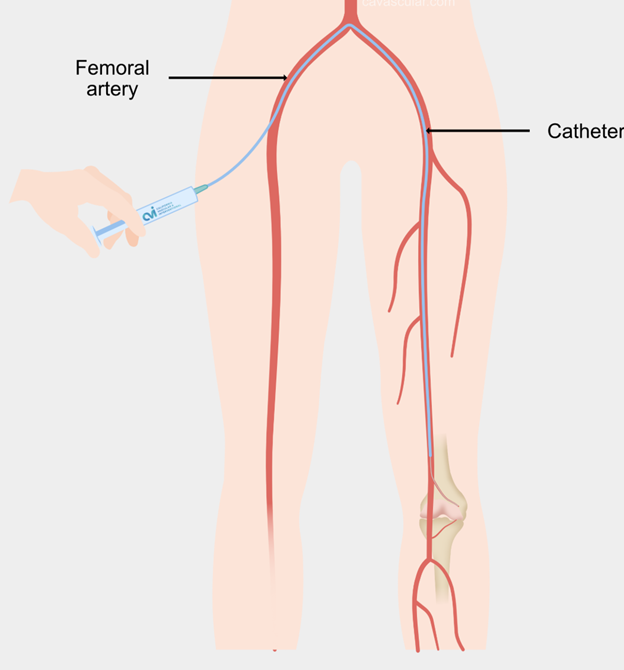What Is Knee Osteoarthritis?
Osteoarthritis (OA) is a degenerative joint disease that causes the cartilage in the knee to wear down over time. As the cartilage thins, the surrounding tissues—including the synovial lining—become inflamed. Inflammation increases abnormal blood flow to the joint, which can worsen pain.
Common symptoms include:
- Chronic, dull or sharp knee pain, often worse with activity
- Stiffness and decreased range of motion
- Pain that limits walking, standing, or sleep
- Occasional swelling or tenderness of the joint
Over time, these symptoms reduce quality of life and may lead patients to consider invasive options like joint replacement.





Traditional Treatment Options from Orthopedic and Pain Specialists
Most patients with knee OA are offered a range of treatments before surgery, including:
- Medications
- NSAIDs (e.g., ibuprofen, naproxen) for inflammation
- Acetaminophen for mild pain relief
- Drawbacks: limited long-term effectiveness, potential GI or kidney side effects
- Injections
- Cortisone (steroids): reduce inflammation for weeks
- Hyaluronic acid (gel): temporary cushioning
- Platelet-rich plasma (PRP): promote joint healing
- Drawbacks: relief often temporary; repeated injections can lose effectiveness
- Physical Therapy
- Strengthening and flexibility exercises
- Bracing and assistive devices
- Drawbacks: may not be enough for advanced OA
- Knee Replacement Surgery
- Total or partial knee arthroplasty
- Highly effective but requires general anesthesia, hospitalization, and months of rehab
- Not ideal for younger, active, or surgery-averse patients
How We Treat Knee OA at Vascular Clinic
Genicular Artery Embolization (GAE)
At Vascular Clinic, we offer Genicular Artery Embolization (GAE)—a minimally invasive outpatient procedure to relieve knee pain by reducing abnormal blood flow and inflammation in the joint.


How the Procedure Works:
- Performed under local anesthesia and mild sedation
- A small catheter is inserted through the groin artery
- Under live X-ray guidance, we navigate to the genicular arteries (which supply the inflamed knee lining)
- We inject microscopic particles to block the abnormal vessels that feed inflammation
- Blood is safely redirected through other arteries—circulation to the leg remains intact
Key Advantages of GAE:
- No surgical incision – just a pinhole
- Preserves future surgical options – does not interfere with joint replacement later
- Quick recovery – walk the same day, resume normal activity within 1–2 days
- Often repeatable if pain returns years later
Ideal for men and women with moderate to severe OA pain who:
- Aren’t ready for surgery
- Aren’t eligible for surgery due to medical risk
- Want to delay joint replacement
What to Expect After GAE
- Procedure time: about 1 hour
- Go home the same day
- Some bruising or mild soreness at the catheter entry site
- No crutches or formal rehab required
- Pain relief begins gradually – often noticeable by 2 weeks, and continues to improve over 1–2 months
- Clinical studies show pain scores dropping from 8/10 to 3/10 on average
We schedule follow-up visits at 1, 3, and 6 months to track improvement and adjust any pain medications in coordination with your PCP or orthopedic doctor.
Frequently Asked Questions
Does GAE cure arthritis?
GAE does not regrow cartilage, but it treats the inflammation and abnormal blood flow that drive chronic pain.
Can I still have knee surgery later?
Absolutely. GAE is non-destructive and reversible. It does not prevent future surgery.
How long does the pain relief last?
Many patients experience relief lasting 1–3 years. The procedure is repeatable if pain returns.
Is GAE covered by insurance?
Coverage varies. Our team will help verify benefits and discuss financial options if needed.
Why Choose Vascular Clinic?
- Board-Certified Interventional Specialists with experience in musculoskeletal embolization
- Advanced angiography suite with precision imaging and low radiation exposure
- Collaborative approach with orthopedic and pain management providers
- Quick access to care no months-long waitlists
- Compassionate support for patients living with chronic pain
If you’re in your 40s to 70s and tired of knee pain, but not ready for a new knee, GAE may be the right option at the right time.




